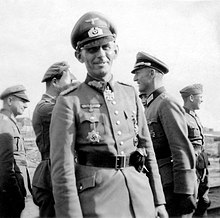Hans Schlemmer (General)
Johannes "Hans" Schlemmer (born January 18, 1893 in Nesselwang , † June 26, 1973 in Bad Kreuznach ) was a German engineer and army officer, most recently a general of the mountain troops , in World War II .
Life
family
Schlemmer was the son of a senior customs officer. His brother Ernst also embarked on a military career and made it up to lieutenant general . Schlemmer himself married Agnes Hofmann in 1920.
Empire and First World War
After graduating from high school on August 1, 1913, he joined the 2nd Pioneer Battalion of the Bavarian Army as a flag junior . With the beginning of the First World War , Schlemmer moved with the 5th field artillery regiment “King Alfons XIII. von Spanien “ , in the function of a train and battery driver, from Landau into the field. This was followed by promotions to lieutenant (December 1914) and first lieutenant (April 1918).
Interwar period
At the end of the war, Schlemmer was accepted into the initially 200,000-strong transitional army. After the final formation of the 100,000-man army of the Reichswehr , he was transferred to the 7th (Bavarian) Artillery Regiment in Landsberg am Lech , where he was promoted to captain in 1926 . In the same year he began studying at the Technical University of Charlottenburg , which he completed in 1930 with his state examination as a graduate engineer .
Period of National Socialism and World War II
In 1934 Schlemmer was promoted to major . A year later, he was due to the rearmament of the Reich Ministry of War as a group leader at the Army Ordnance Department reassigned. On March 16, 1937, he was promoted to lieutenant colonel . After the Blomberg-Fritsch crisis in 1938, he was appointed to the Army High Command . In the same year he was given command of a division of the Mountain Artillery Regiment 111 in Innsbruck , which he led after his promotion to colonel in 1939 during the attack on Poland . Schlemmer then received command of 7th Artillery Regiment of the 7th Infantry Division , with which he took part in the campaign in the west . He was appointed artillery commander 148 (Arko 148) in March 1941 and took part in the Russian campaign in this position . From mid-December 1941 he commanded the 134th Infantry Division on the Eastern Front in the Moscow area with interruptions . In February 1942 he was promoted first to major general , and in early 1943 to lieutenant general. From February 1944 to April 1944 he was in the Führerreserve . In 1944 he was the last to get command of the LXXV before the end of the war . Army corps that fought alongside Marshal Rodolfo Graziani in Italy . In November of that year he received the rank of general of the mountain troops. At the end of the war he was taken prisoner by the Americans , from which he was released on June 17, 1947.
Schlemmer died in Bad Kreuznach and is buried in the city cemetery there.
Awards
- Iron Cross (1914) 2nd and 1st class
- Wound badge (1918) in black
- Bavarian Order of Military Merit IV class with swords and crown
- Cross of Honor of the World War
- Clasp for the Iron Cross, 2nd and 1st class
- Medal Winter Battle in the East 1941/42 on August 18, 1942
- German cross in gold on January 23, 1942
-
Knight's Cross of the Iron Cross with oak leaves
- Knight's Cross on April 21, 1942
- Oak leaves on January 18, 1944 (369th award)
- Mentioned in the Wehrmacht report on October 18, 1943 and February 9, 1944
Web links
Individual evidence
- ^ Samuel W. Mitcham: German Order of Battle: 1st-290th Infantry divisions in World War II . Stackpole Books, 2007, ISBN 978-0-8117-3416-5 , pp. 188 ( google.de [accessed June 8, 2019]).
- ↑ a b c Reichswehr Ministry (Ed.): Ranking list of the German Reichsheeres. Mittler & Sohn Verlag, Berlin 1930. p. 144.
- ↑ a b Veit Scherzer : Knight's Cross bearer 1939–1945. The holders of the Iron Cross of the Army, Air Force, Navy, Waffen-SS, Volkssturm and armed forces allied with Germany according to the documents of the Federal Archives. 2nd Edition. Scherzers Militaer-Verlag, Ranis / Jena 2007, ISBN 978-3-938845-17-2 , p. 664.
- ↑ Walther-Peer Fellgiebel : The bearers of the Knight's Cross of the Iron Cross: 1939–1945. Podzun-Pallas, Friedberg 1986, ISBN 3-7909-0284-5 , p. 378.
- ↑ Walther-Peer Fellgiebel: The bearers of the Knight's Cross of the Iron Cross: 1939–1945. Podzun-Pallas, Friedberg 1986, ISBN 3-7909-0284-5 , p. 76 No. 369.
| personal data | |
|---|---|
| SURNAME | Schlemmer, Hans |
| ALTERNATIVE NAMES | Schlemmer, Johannes |
| BRIEF DESCRIPTION | German officer, most recently general of the mountain troops in World War II |
| DATE OF BIRTH | January 18, 1893 |
| PLACE OF BIRTH | Nesselwang |
| DATE OF DEATH | June 26, 1973 |
| Place of death | Bad Kreuznach |

